People are twice as likely to trust a robot for heart surgery than with their savings, finds study
Just 7 per cent of people would trust a robot with their savings, versus the 14 per cent willing to submit to a machine for heart surgery

Andy Maguire faces a challenge: tasked with upgrading HSBC’s digital-banking systems, he has discovered that customers are twice as likely to trust a robot for heart surgery than for picking a savings account.
“I do find it slightly odd,” said the chief operating officer of Europe’s largest bank, referring to its survey of more than 12,000 consumers in 11 countries published on Wednesday. Just 7 per cent of respondents would trust a robot with their savings, versus the 14 per cent willing to submit to a machine for heart surgery.
“You think, gosh, one would’ve imagined the world had moved on further or was moving faster than that,” Maguire said in an interview. While consumers tend naturally to trust medical professionals, the “bar is pretty high” for banks dealing with people’s money, he said.
Banks around the world are spending billions of pounds to bolster creaking computer systems in a push to ward off startup competitors and cut long-term operating expenses. But consumers and regulators are holding them to ever-higher standards of security and convenience, driving the cost of overhauls higher and potentially eroding any savings.
HSBC’s survey of attitudes to automated banking found that while four out of five people believe technology will make their lives easier, some tools being adopted by the finance industry are yet to win consumers’ trust.
Less than half of respondents said they trust fingerprint recognition to replace their password, with only a fifth using the tool.
Just 6 per cent use voice recognition, regardless of the security benefits, according to the report.
The report’s findings come at a potentially embarrassing time for HSBC, a week after a BBC reporter tricked the bank’s voice-recognition software. That showed the risks lenders face as they try to innovate in an industry which, almost a decade on from the global financial crisis, still suffers from low levels of trust on the part of the general public.
“I’m slightly unimpressed when we’re trying to do something genuinely good for customers,” Maguire said. “These guys were colluding to try and break into the account. If they’d done it with pins and passwords, they would’ve got in without anyone knowing anything at all.”
HSBC has caught £4m of fraud attempts since introducing the voice recognition tool just under a year ago and will make some improvements after the BBC incident, Maguire said. “We can make the bank completely secure, but it’d also be impossible to deal with,” he added.
The financial industry’s expansion in technology investment comes as startups push to steal clients from major lenders. But Maguire said that trend won’t erode HSBC’s profitability, because the lender can work with fintech companies to improve its own services.
“HSBC is a great place for fintechs to come and get rich,” he added.
Bloomberg
Join our commenting forum
Join thought-provoking conversations, follow other Independent readers and see their replies
Comments
Bookmark popover
Removed from bookmarks